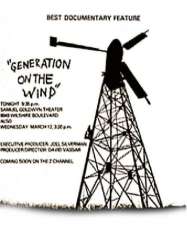Windfall is a film of genre Documentary released in USA on 3 february 2012
Windfall (2012)

If you like this film, let us know!
- Infos
- Casting
- Technical infos
- Photos
- Videos
- Film quotes
- Characters
- Music
- Awards
Released in USA 3 february 2012
Genres Documentary
Themes Environmental films, Documentary films about environmental issues, Documentary films about technology
Rating55%










Windfall is a 2010 documentary film directed by Laura Israel about the reaction of residents in rural Meredith, New York (in Delaware County, New York) to a proposal to place numerous wind turbines in their community to harness wind power. It's important to note that this film was done by an interested local citizen, not some organization with an agenda. Laura did this film because she had a media degree from NYU, and this seemed like an compelling local activity that would have broader interest to citizens countrywide.
Laura is not an energy expert, and does not portray herself as one. She is a citizen who went to great lengths to have people on both sides of the story have their say. (The wind developer was asked to be interviewed for the film, but they declined.) The narrative relates to what happens when citizens get more educated about the very technical issue of industrial wind energy. In essence, this is a story about the democratic process.
Comments
Leave comment :
Suggestions of similar film to Windfall
There are 8961 with the same cinematographic genres, 1027 films with the same themes (including 136 films with the same 3 themes than Windfall), to have finally 70 suggestions of similar films.If you liked Windfall, you will probably like those similar films :

The Pipe (2011)
Genres Documentary
Themes Environmental films, Documentary films about environmental issues, Documentary films about technology
Rating76%






The Last Bomb (1945)
, 35minutesDirected by Frank Lloyd
Origin USA
Genres Documentary
Themes Environmental films, Seafaring films, Transport films, Aviation films, Documentary films about environmental issues, Documentary films about war, Documentary films about historical events, Documentary films about nuclear technology, Documentary films about technology, Political films, Documentary films about World War II, United States Armed Forces in films
Actors Reed Hadley, John Arthur Kennedy, James Seay, Don Taylor
Rating63%






Go Further (2003)
, 1h20Origin Canada
Genres Documentary
Themes Films about animals, Environmental films, Documentary films about animal rights, Documentary films about law, Documentary films about environmental issues, Documentary films about health care, Documentary films about technology, Political films, Documentary films about nature
Actors Woody Harrelson
Rating63%






The Atom Strikes! (1945)
, 31minutesOrigin USA
Genres War, Documentary
Themes Environmental films, Seafaring films, Transport films, Aviation films, Documentary films about environmental issues, Documentary films about war, Documentary films about historical events, Documentary films about nuclear technology, Documentary films about technology, Political films, Documentary films about World War II
Rating58%






Generation on the Wind (1979)
Origin USA
Genres Documentary
Themes Environmental films, Documentary films about environmental issues, Documentary films about technology

The Fog of War (2003)
, 1h35Directed by Errol Morris
Origin USA
Genres War, Documentary, Historical
Themes Environmental films, Documentary films about environmental issues, Documentary films about war, Documentary films about historical events, Documentary films about nuclear technology, Documentary films about technology, Political films
Actors Errol Morris
Rating80%





The overall plot of the film focuses on the interviews of former Secretary of defense, Robert McNamara, who was interviewed for about 20 hours by the director of the documentary, Errol Morris, through a special device called the "Interrotron" which projects images of interviewer and interviewee on two-way mirrors in front of their respective cameras so each appears to be talking directly to the other. Use of this device is intended to convey actual interaction with each other and direct eye contact with the viewer.

PetroApocalypse Now? (2008)
, 48minutesOrigin United-kingdom
Genres Documentary
Themes Environmental films, Documentary films about environmental issues, Documentary films about technology

Finding Farley (2009)
, 1h2Origin Canada
Genres Documentary
Themes Films about writers, Environmental films, Seafaring films, Sports films, Transport films, Documentary films about sports, Documentary films about environmental issues, Documentaire sur une personnalité, Documentary films about technology, Documentary films about nature
Rating74%






Atomic Power! (1946)
, 18minutesOrigin USA
Genres Documentary
Themes Environmental films, Documentary films about environmental issues, Documentary films about war, Documentary films about historical events, Documentary films about nuclear technology, Documentary films about technology
Rating54%






Nuclear Tipping Point (2010)
, 56minutesGenres Documentary
Themes Environmental films, Documentary films about environmental issues, Documentary films about war, Documentary films about historical events, Documentary films about nuclear technology, Documentary films about technology, Political films
Rating67%





 Connection
Connection